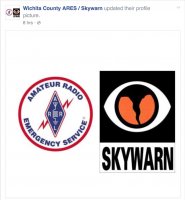Jay Farlow
EF0
... amateur radio is not dead as a reporting method, and most nets/EMs in the Plains, Midwest and South would greatly welcome information from experienced chasers via this medium. There really is a void right now that could be filled by us (by "us", I mean storm chasers).
I was happy to draw a similar conclusion. Even though I've been a ham for decades, I had begun to wonder about ham radio's future in storm spotting, especially here in Indiana, where cell coverage is pretty good. We have an added challenge in the IWX CWA. If a volunteer ham is not available to staff the ham station at the WFO, it remains off the air and the various nets must use NWSChat or telephone to relay reports from ham-radio-equipped spotters. Our WFO is not located near a population center (it's an hour drive from either Fort Wayne or South Bend), which limits the number of hams who are available to go to the WFO.

